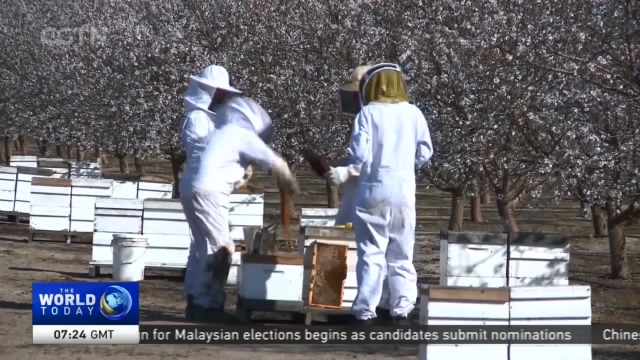
16:11, 28-Apr-2018
Keeping Bees Healthy: American company tests all-natural formulas on bees in almond field
03:04

The bee population in North America has taken a significant hit this year. Many suspect pesticides are to blame. Startup company Beeflow is developing liquids that could be sweeter than honey for bees' health. Mark Niu has more.
At San Francisco's IndieBio accelerator lab, CEO Matias Viel of the startup Beeflow works with a formula he can't reveal. But he believes the company's two concoctions could have ground breaking implications. In this almond field, in California's Central Valley, the lab is testing its all-natural formulas on bees.
MARK NIU HANFORD, CALIFORNIA "Seven of the hives here have a syrup that's actually mixed with one of Beeflow's special concoctions. Another seven hives have the other Beeflow concoction, while yet another seven have both."
One contains an organic compound specially designed to boost the bees' immune system.
MATIAS VIEL CO-FOUNDER & CEO, BEEFLOW "In 2016 USDA has recorded that 44% of the bee population has been lost because of low temperatures and because bees were exposed to pesticides that decrease their immune system. The immune system of the bees is affecting their behavior while pollinating crops. We started feeding bees with this technology to develop stronger bees that can work under low temperatures."
Beeflow co-founder Agustin Saez, who has a Ph.D. in crop pollination, is researching precisely how much pollination is needed for this farm. He also helped develop Beeflow's second formula, which conditions the bees to stay on course.
AGUSTIN SAEZ CO-FOUNDER, BEEFLOW "You can apply these molecules, so the bees are going to learn which specific crop do you want to pollinate. That works well when you have competitive flora, and you want to have the bees working on the crop you want to pollinate."
Beeflow has already conducted tests in Argentina, where it says it helped farmers increase yields by 20 to 90-percent. Compared to regular blueberries, theirs grew 13-percent larger. Their Kiwi fruit - 30 percent larger.
MATIAS VIEL CO-FOUNDER & CEO, BEEFLOW "A small apple has less seeds in comparison with a bigger apple. Because before the apple there was a flower that received X amount of pollen being transferred by bees. The size of the fruit has different prices in the market as well."
The almond fields at Simba Farms are Beeflow's first US test.
JOHN BAKER PARTNER, SIMBA FARMS "Cost of hives today is somewhere in the range between 185 to 225 dollars. This year we're at about 750 hives. If we could somehow quantify the number of bees that we actually truly need."
The impact on the almond crop here will be determined in a few months' time-one more step in Beeflow's scientific journey to prove bees can do much more than ever imagined. Mark Niu, CGTN, Hanford, California.

SITEMAP
Copyright © 2018 CGTN. Beijing ICP prepared NO.16065310-3
Copyright © 2018 CGTN. Beijing ICP prepared NO.16065310-3